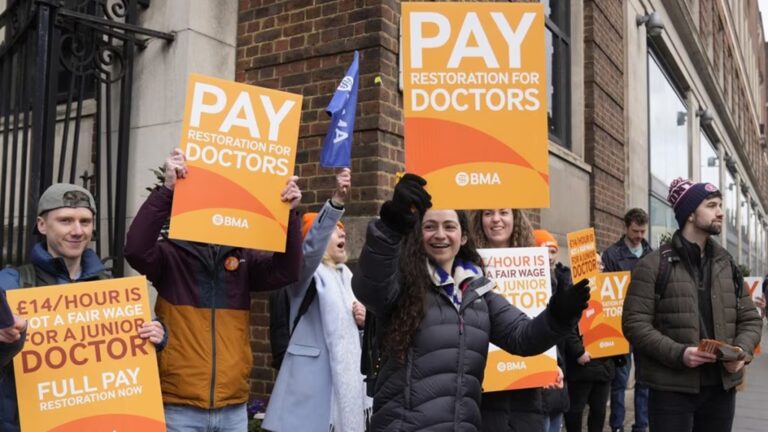Thousands of doctors in England staged their 11th strike on Thursday in a long-running dispute with the government over pay and working conditions, disrupting hospital services just days before the UK general election.
The five-day strike by junior doctors early in their careers has highlighted problems plaguing Britain’s chronically underfunded National Health Service (NHS), the state-run public health system, and is a top concern for voters going to the polls on July 4.
Junior doctors, who form the backbone of healthcare in hospitals and clinics, have been embroiled in a pay dispute with the government since late 2022. They went on strike for six days in January, the longest in NHS history, forcing hospitals to cancel tens of thousands of appointments and surgeries.
The latest strike began Thursday and ends Tuesday, just two days before voters vote to elect members of the House of Commons. The doctors’ union, the British Medical Association, says doctors’ salaries have fallen by a quarter over the past 15 years and is seeking a 35 percent pay rise. The union says new doctors earn about 15 pounds ($19) an hour compared with Britain’s minimum wage of just over 10 pounds an hour, with pay rising sharply after the first year.
Dr Sumi Manirajan, vice-chair of the union’s junior doctors committee, said years of underinvestment had led to young doctors leaving in droves for countries with higher salaries, leaving those who stayed behind to suffer from severe overwork and low pay.
“The doctors I trained with in London were among the best in the country but they went to New Zealand. In fact, I wonder why I’m not doing the same. I want my work to be recognised,” she said. Manilajan, a recent graduate who works in obstetrics and gynaecology, added that she sees many women waiting more than a year for routine procedures. “These patients are in pain and it pains us to see these patients keep coming back for the same problem which we know could be treated if we had enough doctors,” she said.
The Conservative government gave doctors pay increases of between 8.1 and 10.3 percent last year, which it claims was a generous settlement. It argued that officials could not make pay offers in the run-up to an election, but the unions have refused to call off the strike.
Manilajan said it was unfortunate that the government decided to hold the election knowing that the dispute was unresolved. He said the doctors’ union was open to discussions and had already held talks with the opposition Workers’ Party, which has a significant lead in the polls.
“It is hard to see how either the Conservatives or Labour can deliver on their manifesto promises to restore the performance of the NHS in the next parliament without first ending the debate,” said Siva Anandashiva, chief analyst at the King’s Fund think tank.

